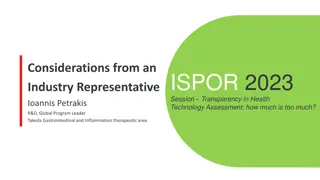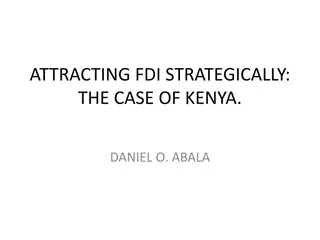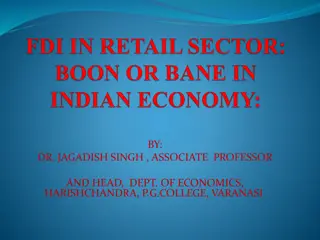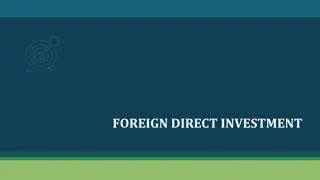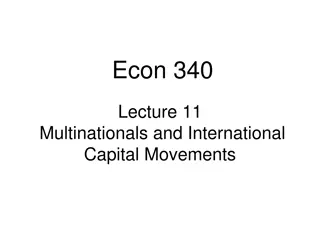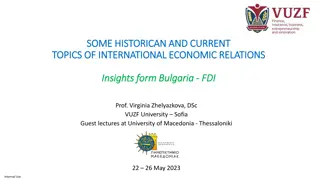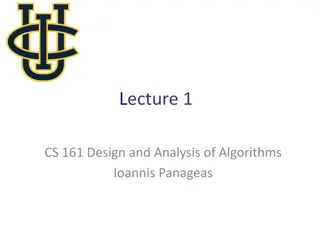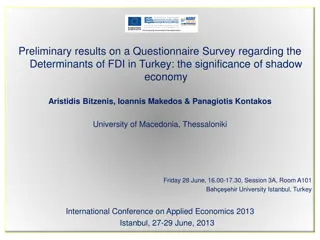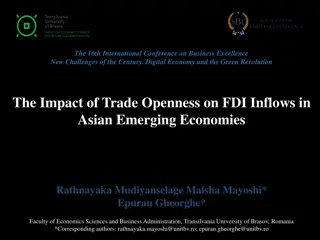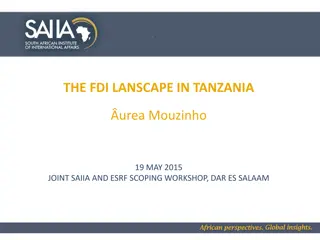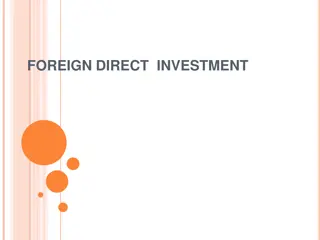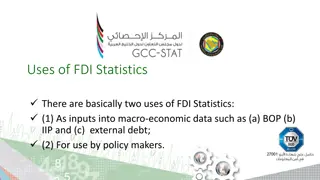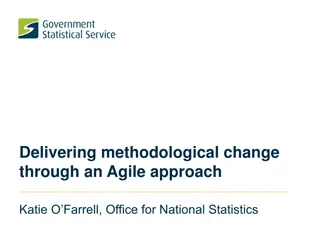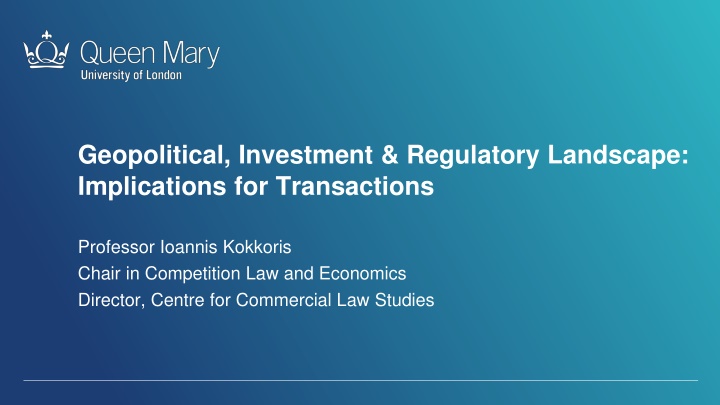
Geopolitical Investment Regulatory Landscape: Implications for Transactions
Explore the rise in foreign investment screening and its causes, effects, and implications on a global scale. Delve into the background, concerns, and key features of Regulation 2019/452. Understand how factors like critical infrastructure, technology, and media freedom trigger security concerns for foreign investors. Discover the impact of Covid-19, geopolitical tensions, and industrial shifts on the investment landscape.
Uploaded on | 1 Views
Download Presentation

Please find below an Image/Link to download the presentation.
The content on the website is provided AS IS for your information and personal use only. It may not be sold, licensed, or shared on other websites without obtaining consent from the author. If you encounter any issues during the download, it is possible that the publisher has removed the file from their server.
You are allowed to download the files provided on this website for personal or commercial use, subject to the condition that they are used lawfully. All files are the property of their respective owners.
The content on the website is provided AS IS for your information and personal use only. It may not be sold, licensed, or shared on other websites without obtaining consent from the author.
E N D
Presentation Transcript
Geopolitical, Investment & Regulatory Landscape: Implications for Transactions Professor Ioannis Kokkoris Chair in Competition Law and Economics Director, Centre for Commercial Law Studies
Outline Foreign investment (FDI) screening on the rise Causes and Effects Regimes in EU/US/China 2
Background and Rationale Global trends Move toward a multipolar world economic order Digitalisation Crisis of multilateralism Vulnerability of global value chains - As highlighted and enhanced by Covid-19 3
Background and Rationale Concerns Fair competition (in the internal market) Reciprocity Sensitive (critical, strategic ) assets Data protection 4
Foreign investment screening on the rise: Causes Background: Regulation 2019/452 is a framework for screening FDI into the Union (came into force in October 2020). Key Features: This is the first time that the EC will have a role in the assessment of FDI. The EC does not have authorityto disapprove the FDI, instead, issues non-bindingopinions. The final decision still rests solely in the Member State (MS) where the FDI screening is taking place. Scope: Security or public order grounds, and it covers only M&A, omitting greenfield or portfolio investments. The following five factors trigger security or public order concerns if acquired by foreign investors: 1) Critical infrastructure, counting a wide range of sectors from health to electoral or financial infrastructure; 2) Critical technologies and dual use items; 3) Supply of critical inputs, comprising energy or raw materials, as well as food security; 4) Access to sensitive information, including personal data, or the ability to control such information; and 5) The freedom and pluralism of media.
Foreign investment screening on the rise: Causes Covid-19 highlighted the fragility of global supply chains Geopolitical tensions (including use of sanctions) Erosion of trust, weaponisation of economic relations Big industrial, technological shifts (AI, green transition ) Dissatisfaction with free-market ( neoliberal ) ideas 7
Foreign investment screening on the rise: Effects Deglobalisation Decoupling from unreliable economic partners Protection of strategic industries and sensitive assets Industrial policy making a comeback Appetite for stricter regulation and flexible competition policy 8
Evidence / 1 Scaling up EU companies within the Single Market is essential if we are to maintain and enhance our international role. This strategy will bolster the EU's strategic autonomy, economic power, and global policy influence. By scaling up, our companies diversify supply chains, champion European standards worldwide, and enhance their global competitiveness. Enrico Letta, Much More than a Market: Speed, Security, Solidarity, p. 50 In a benign international environment, we trusted the global level playing field and the rules-based international order, expecting that others would do the same. But now the world is changing rapidly and it has caught us by surprise. [ ] We are lacking a strategy for how to shield our traditional industries from an unlevel global playing field caused by asymmetries in regulations, subsidies and trade policies. Mario Draghi (16 April 2024) 9
Evidence / 2 I strongly believe that industrial policy is key for our prosperity and in relation to the outside world, as well as in the development of European territories and regions. [ ] This industrial policy [ ] must have production targets on European soil, training initiatives, joint investments, and it must consolidate what we have already done in strategic sectors: raw materials, semiconductors, digital technology and healthcare, where European policy is also a response to the needs of our fellow citizens. It is this policy alone that will enable us to respond to the shortages of medicines we are experiencing, or to the issue of patient access. Emmanuel Macron (26 April 2024) 10
EU Law Regulation 2019/452 ( FDI Screening Regulation ) Regulation 2022/2560 ( Foreign Subsidies Regulation ) European Economic Security Strategy (2023) Proposal for a revised FDI Screening Regulation (2024) to ensure that all MSs have a screening mechanism in place to harmonise national rules, eg minimum sectoral scope to capture EU investors controlled by non-EU entities (not covered by the current Regulation per C-106/22 Xella) 11
FDI Screening and Protectionism / 1 Asking whether EU economic regulation is protectionist is not new (eg Bradford 2023 on protectionism in merger control) The FDI Screening Regulation allows screening on security or public order grounds, not on economic grounds It provides a broad range of factors that may be taken into account (Art 4), but doesn t constrain interpretation by MSs Some argue that centralised screening would be protectionist But that depends on the concrete approach to enforcement 12
FDI Screening and Protectionism / 2 Protectionism is in the eye of the beholder Until about 2016, investment screening enjoyed rather unfavourable press in many [MSs] and within [EU] institutions. An air of protectionism was associated with some of the few cases that came to public attention. Investment screening was considered a barrier to international capital flows and an obstacle to economic opportunities [ ] In the few years that have passed since then, perceptions in many [MSs] have changed quite dramatically (OECD 2022, p. 16) 13
FDI Screening and Protectionism / 3 Arguments against the protectionist reading Decentralised enforcement prevents distortions Flexible notions of security and public order are necessary to address a diverse range challenges May enhance free trade globally (to establish reciprocity) 86% of transactions cleared unconditionally in 2022 14
FDI Screening and Protectionism / 4 Arguments for the protectionist reading Criteria too vague if not openly misleading Legal uncertainty deters FDI regardless of security implications EUMR already protects relevant interests (Art 21) Concern with reciprocity has nothing to do with security Only a stepping stone to a fully harmonised mechanism Blocked transactions don t consider deterrence Cross-border M&A fell 12-17% per year (Eichenauer-Wang, 2024) 15
Intra-EU Operations: The Safran / Microtecnica Case Safran is a French jet engine maker Microtecnica is the Italian subsidiary of Collins Aerospace Safran agreed to acquire from Collins its flight control business (which includes Microtecnica) for $1.8 bln Italian government used its golden power to halt the sale, claiming that the new owner might fail to give the necessary priority to the industrial production lines of interest for national defence 16
Italys Golden Power regime Introduced by Law Decree 21/2012, it is now arguably the most extensive in the EU Scope: similar to other regimes (plus since 2021 refers to Art 4(1) FDI Reg): defence and national security; energy, transportation, communication (including 5G), health, agri-food Extra areas: eg finance (including credit and insurance) May apply to EU (including Italian) investors and even intra-group operations, depending on strategic status of the sector Grew from 46 notifications in 2018 to 608 in 2022 Some commentators (eg Gallo 2022) claimed that the most incisive provisions were only compatible with EU law due to their temporary nature Some of these have since been made permanent: infringement proceeding likely? 17
Evolution No EU-wide FDI framework before 2017 2017: Communication Welcoming Foreign Direct Investment while Protecting Essential Interests 2019: Regulation 2019/452 ( Screening Regulation ) Legal basis: Article 207 TFEU Guidance 18
Screening Regulation: Goals Safeguard security and public order Establish framework and common criteria to identify risk Enable cooperation between MSs, and MSs and EC eg target undertaking has subsidiaries in several MSs Increase transparency and understanding or EU-wide risks eg risks to projects or programmes of Union interest, namely those which receive substantial EU funding or are covered by EU law projects and programmes of Union interest are listed in the Annex 19
Screening Regulation: Scope Foreign Direct Investment Entity/entities established outside the EU But anti-circumvention clause (cf C-106/22 Op AG apeta) To establish or maintain lasting and direct links To carry out economic activity in MS Applicable to all sensitive sectors M&A / portfolio / greenfield EU screening complements, doesn t replace MS screening Doesn t apply to intra-EU or EU-to-third countries deals 20
Screening Regulation: Critical Factors Potential effects on Critical infrastructure (physical or virtual) and sensitive facilities Critical technologies and dual items Supply of critical inputs (including food security) Access to sensitive information (including personal data) Media pluralism Characteristics of investor Directly or indirectly controlled by government Previous involvement in activities affecting security or public order in a MS Risk of illegal or criminal activity 21
Screening Regulation: Principles to help effective cooperation Case-by-case, contextual assessment Non-discrimination Prohibition only if mitigation is not effective or appropriate Definitions of security and public order left open List of critical factors related to investor or potential effects (Article 4) Interpretation must comply with international obligations (GATS) Genuine and sufficiently serious threat Screening on economic grounds not allowed 22
Screening Regulation: Cooperation MSs are not required to have screening mechanism in place But they re invited to do so (see Guidance) MSs must notify EC of new or amended mechanisms within 30 days EC maintains a public list of MS screening mechanisms As of 2024, 27 MSs either had a screening mechanism in place, or had initiated process for its adoption 23
Screening Regulation: Cooperation MS notifies EC+MSs if investment screened at national level If not, MS provides information confidentially without delay when requested EC issues opinion if transaction likely to affect 1+ MSs MS issues comment if transaction likely to affect it MS where investment takes place has final decision Comments and opinions not binding, but are given due consideration Opinions on projects or programmes of Union interest take utmost account 24
Screening Regulation: Annual Reporting on Cooperation Cooperation mechanism is strictly confidential No information on individual transactions nor opinion can be disclosed MSs report to EC aggregate data on FDI and their screening EC reports to EP and Council on regulation implementation 2nd Annual Report published in 2022 EC will report to EP and Council by Oct 23 (then every 5 ys) on the effectiveness of the Regulation 25
Challenges / 1 Legal challenges Coordinating MS regimes when national security concerns and investment priorities differ Ensuring transparency and predictability Addressing concerns of third countries Balancing investment and security concerns 26
Challenges / 2 Economic challenges Impact on transaction costs Impact on firm performance Impact on international trade Impact on capital accumulation 27
FDI: National Security and Supply Chain Considerations Definition: Although the concept of National Security has not been well defined, more regulations use it to address foreign investment concerns. Scope: CFIUS initially had authority to oversee inbound investments involving human resources, energy supplies, etc. In 2020, CFIUS was given jurisdiction over certain non-controlling covered investments by foreign persons in US businesses that deal in critical technology, critical infrastructure or sensitive personal data. CFIUS s authority was increased to review real state transactions for potential national security implications. Also, a mandatory filing was introduced for certain non-controlling covered investments, exempting investors from friendly countries such as Australia, Canada, and the UK. The scope continuously expands. Most recently, a reform is expected, known as the reverse CFIUS (overseeing outbound investment from U.S. to China on investments in AI, quantum computing and semiconductors). Implications: The number of transactions scrutinised between 2017 and 2021 (661) has been more than twice as many as during the previous five years. Although the number of transactions that have been blocked is relatively low, many are withdrawn before a final decision is made because interested parties are not willing to bear the strict levels of scrutiny and uncertainty.
FDI: National Security and Supply Chain Considerations The COVID-19 pandemic exposed serious fragilities in a wide range of global supply lines. The US government realised: That 90 percent of the propellant used in US munitions is singularly sourced in China, which could put the US at great risk during an armed conflict. That a high percentage of pharmaceutical ingredients, particularly those used in generic brand drugs, and other important medicines like insulin, come from China. America s pharmaceutical supply remains vulnerable. That the Defense Production Act was essential to allow repurposing of factory capacity for ventilators during the first wave of the outbreak, but it wasn t enough to address the shortage. The US does not have the physical- capacity to respond to future major shocks to its supply chains. That government actors (e.g., Department of Commerce and local governments) do not understand how their actions affect other entities, and might not understand the incentives and operations of private suppliers. That private industries are unaware of how their actions affect overall ability to respond to a national security challenge (e.g., to what extent offshoring could affect the U.S. ability to access critical material in time of crisis). The above concerns are expected to be alleviated through legislation, corporate strategy, and coalition-building.
FDI: National Security and Supply Chain Considerations In the US: Securing Critical Supply Chains The US is using subsidies, export controls and other forms of industrial policy to shift supply chains away from geopolitical rivals, especially China, to keep advanced technology and other critical supply chains out of hostile hands: On 7 October 2022, a new set of regulations known as the Foreign Direct Product Rule (FDPR) were announced restricting sales of items based on American technology, even if they are designed and manufactured abroad. The US has the Entity list, a list of companies to which it is illegal to export technology from America. The number of Chinese firms on this entity list enlarged from 130 in 2018 to 532 in 2022. Chinese companies account for more than a quarter of the firms on the list. In 2019, the Department of Commerce prohibited American firms to selling chips made in America to Huawei, a Chinese telecoms firm that was seen as a national-security threat. The Investing at Home legislative proposal, would require American companies to notify of overseas spending, raising the possibility that the White House could block some investments in China. The Chips Act, passed in 2022, provides $52bn on incentives for the semiconductor industry to increase the America s share of chip manufacturing. The Inflation Reduction Act, passed in 2022, provides nearly $400bn on incentives to boost clean energy and reduce dependence on China in important supply chains, such as for electric vehicles.
FDI: National Security and Supply Chain Considerations In the UK: The National Security and Investment Act 2021 Background: The NSI ACT came into force on 4 January 2022. Key Features: The Investment Security Unit was created to enforce the NSI ACT. Mandatory Notification of transactions that trigger some events, involving qualifying entities and 17 key sectors. Voluntary notification for certain transactions that may give rise to national security concerns. The Secretary of State has call-in powers and must have regard to the target risk, control risk and acquirer risk. Scope: Qualifying entity : Domestic UK and foreign entities (if it carries on activities in the UK or supplies goods or services to the UK). Trigger events : The acquirer gains or increases voting rights or shares (thresholds established). Key Sectors: Advanced materials, Advanced robotics, AI, Civil nuclear, Communications, Computing hardware, Critical suppliers to Government, Suppliers to the emergency services, Cryptographic authentication, Data infrastructure, Defence, Energy, Military and dual use, Quantum technologies, Satellite and space technology, Synthetic biology and Transport.
FDI: National Security and Supply Chain Considerations In the UK: The National Security and Investment Act 2021 Void Transactions: Transactions that fall under the mandatory regime cannot be completed until clearance is granted, and transactions that take place withoutclearance will be void. Penalties for non-compliance: There are civil and criminal penalties for completing a notifiable acquisition without approval. The penalties include: Imprisonment for up to five years. Fines of up to 10 million (or, if higher, 5% of worldwide turnover). Disqualification as a director for up to 15 years. Recent Trends from 4 January 2022 to 31 March 2023: 866 notifications were received (671 mandatory, 180 voluntary and 15 were retrospective). 93% of notifications were cleared within 30 working days. 65 call-in notices were issued (37 followed a mandatory notification, 17 followed a voluntary notification, 10 for non-notified transactions). A low number of transactions have been prohibited or approved subject to conditions.
FDI: National Security and Supply Chain Considerations In China: Measures on Foreign Investment Security Review Background: In 2020, the National Development and Reform Commission (NDRC) and the Ministry of Commerce (MOFCOM) jointly released the Measures on Foreign Investment Security Review, expanding the scope of such reviews. These Measures came into effect in January 2021. Key Features: Enforcers: The Working Mechanism is headed by the NDRC and MOFCOM. Types of of foreign investments subject to the measures: 1) Investments in newly constructed projects made in the People s Republic of China (PRC), or the establishment of enterprises in the PRC, by foreign investors, whether independently or jointly with other investors. 2) Acquisitions by foreign investors of equity rights in, or assets of, enterprises in China by means of merger or acquisitions. 3) Investments made in the PRC by foreign investors through other means.
FDI: National Security and Supply Chain Considerations In China: Measures on Foreign Investment Security Review Scope: The following foreign investments require prior approval from the Working Mechanism Office. Investment in sectors related to national defense and security (e.g., arms industry), and investments in locations in the periphery of military facilities or arms industry facilities. Investments in the following IMPORTANT sectors where foreign investors may exercise actual control: Critical agricultural products, critical energy and resources, manufacture of major equipment, critical infrastructure facilities, critical transportation services, critical cultural products and services, critical information technology and Internet products and services, critical financial services, key technologies and other important sectors Concept of Control: 1) The foreign investor s equity interest in the enterprise is not less than 50%. 2) The foreign investor s equity interest is less than 50% but its voting rights enable it to exercise major influence over the resolutions of the board of directors, shareholders meeting or shareholders general meeting. 3) Other circumstances that enable the foreign investor to exercise major influence over the business decision making, finances, technology, etc.
China: Measures on Foreign Investment Security Review In China: Measures on Foreign Investment Security Review Additional Key Aspects: The Measures are silent on the standards of the substantive review. The Measures do not define the concept of National Security . There is a lack of judicial or administrative redress to review the outcome. Sanctions: If the investors do not report the investment or close the deal before clearance is granted, provide false or incomplete information to pass the security review or do not observe approval conditions, they: i. Will be required to revoke the investment and dispose the relevant shares and assets. ii. Will be required to eliminate the effect on national security. iii. Will face disciplinary penalties in accordance with the relevant national regulations. iv. The credit record of a party to the relevant FI will be negatively affected according to the credit information system of the State. * The Measures do not specify any economic penalties.
China: Measures on Foreign Investment Security Review Some Reflections For the business community it is difficult to navigate the numerous and distinctive FDI rules. Foreign investment rules have proven to be reciprocal tools aimed at counteracting economic power. Supply chain security has become a national priority. FDI screening mechanisms should avoid: Decision-makers with unlimited levels of discretion to decide. Application of national security and national interest considerations ill-defined. Unreasoned final decisions. Lack of judicial review. Rules that are broad in scope and develop through procedures that are unclear.
FSR and the Level Playing Field The Foreign Subsidies Regulation can be described as an outward-looking state aid regime Levelling the playing field was its main rationale since its inception (see 2020 White Paper on Levelling the Playing Field as regards Foreign Subsidies ) Broad notion of foreign financial contribution and high regulatory costs might result in over-deterrence and thus affect fair competition 37
FSR and the Level Playing Field FSR creates a new instrument to prevent foreign subsidies from distorting the European Union (EU) internal market. Fill a perceived regulatory gap left by EU State aid rules applying to subsidies granted by EU countries but not by foreign states. Applies since 12 July 2023 and its notification obligations kick in on 12 October 2023. Procedural details are laid down in the Implementing Regulation (IR) which entered into force on 13 July 2023. When acquiring (including jointly) control of a company in the EU or participating in a public tender in the EU, companies - including EU ones - will have to notify the Commission of foreign financial contributions (FFCs) received from non-EU states if the relevant thresholds are met or if the Commission so requests. Notification is compulsory and suspensory. Failure to notify or to suspend closing pending clearance may lead to severe sanctions. Information requirements are far-reaching as they comprise FFCs irrespective of whether they have a link with the notified transaction or public procurement procedure.
FSR and the Level Playing Field A distortion in the internal market shall be deemed to exist where a foreign subsidy is liable to improve the competitive position of an undertaking in the internal market and where, in doing so, that foreign subsidy actually or potentially negatively affects competition in the internal market. A distortion in the internal market shall be determined on the basis of indicators, which can include, in particular, the following: (a) The amount of the foreign subsidy; (b) The nature of the foreign subsidy; (c) The situation of the undertaking, including its size and the markets or sectors concerned; (d) The level and evolution of economic activity of the undertaking on the internal market; (e) The purpose and conditions attached to the foreign subsidy as well as its use on the internal market. Where the total amount of a foreign subsidy to an undertaking does not exceed EUR 4 million over any consecutive period of three years, that foreign subsidy shall be considered unlikely to distort the internal market. Where the total amount of a foreign subsidy to an undertaking does not exceed the amount of de minimis aid as defined in Article 3(2), first subparagraph, of Regulation (EU) No 1407/2013 per third country over any consecutive period of three years, that foreign subsidy shall not be considered to distort the internal market. A foreign subsidy may be considered not to distort the internal market to the extent that it is aimed at making good the damage caused by natural disasters or exceptional occurrences.
FSR and the Level Playing Field A foreign subsidy is most likely to distort the internal market where it falls under one of the following categories: (a) A foreign subsidy granted to an ailing undertaking, namely an undertaking which will likely go out of business in the short or medium term in the absence of any subsidy, unless there is a restructuring plan that is capable of leading to the long-term viability of that undertaking and that plan includes a significant own contribution by the undertaking; (b) A foreign subsidy in the form of an unlimited guarantee for the debts or liabilities of the undertaking, namely without any limitation as to the amount or the duration of such guarantee; (c) An export financing measure that is not in line with the OECD Arrangement on officially supported export credits; (d) A foreign subsidy directly facilitating a concentration; (e) A foreign subsidy enabling an undertaking to submit an unduly advantageous tender on the basis of which the undertaking could be awarded the relevant contract.
FSR and the Level Playing Field FSR provides the EC with three new regulatory tools: (1) a notification requirement for certain M&A transactions which is separate from the existing merger control and foreign direct investment (FDI) screening regimes, (2) a notification requirement for bidders seeking to participate in large public procurement procedures in the EU, and (3) an ex-officio tool giving the EC wide-ranging powers to investigate suspicious market conduct on its own initiative. In the case of concentrations, the Commission may initiate an in-depth investigation no later than 25 working days after the receipt of the complete notification. The in-depth investigation may not last more than 90 working days from the date the decision to initiate the in-depth investigation was issued. If no decision has been reached after 90 days, the concentration can be implemented. For public procurement procedures, the Commission has 20 working days from receipt of a complete notification to close its preliminary review or, where it suspects distortions, to initiate an in-depth investigation. It must issue a final decision within 110 working days from the receipt of the complete notification, thereby including the preliminary review phase.
Initial Enforcement Steps In the first 100 days since the opening of the notification window, the EC has reviewed over 100 public tender notifications and 53 merger notifications. A third of the merger notifications have concerned investment fund acquirers. Of these 53 cases: 14 were formally notified; 9 cases have been closed following an initial investigation, of which no cases were referred for an in-depth investigation; 33 involved cross-border EU to non-EU transactions, 7 involved a cross-border transaction within the EU, 6 involved transactions within the same EU Member State, and 7 involved a cross-border transaction outside the EU; and 42 pre-notified cases were also subject to a parallel assessment under the EU merger regime, 5 were subject to a national merger procedure, and 26 were subject to foreign direct investment screening in one or several Member States. All but one of the EC in-depth and ex officio investigations to date have targeted Chinese companies that might have received potential subsidies from China. While the FSR is designed to be country-neutral, Chinese subsidies are a focus because the EC is familiar with the role of subsidies in China s economy (and recently updated its lengthy report on the subject). The FSR preparatory documents themselves discussed perceived distortions from such subsidies, and cited examples involving Chinese businesses to illustrate the regulatory gap in mergers and public tenders. The EC is particularly focused on tenderers and acquirers with state connections, such as state-owned enterprises, sovereign wealth funds, and government-owned investment funds.
Initial Enforcement Steps The European Commission asks wide-ranging questions, including: Sources and details related to the financing of the deal. This has particularly been the case if there is any involvement of a non-EU country in the financing of the deal, but also if there is involvement of banks in which a non-EU country has a shareholding; How the transaction originated (in particular if there was no structured bidding process); How price was determined for the target and the correlation between the purchase price and the value of the target; and How the foreign financial contributions data collection was carried out by the Notifying Party(ies) and specific questions about the foreign financial contributions. Detailed questions as to why notifying parties qualify for the disclosure exemptions (e.g., why they consider their contracts to be on market terms), but also on foreign financial contributions in non-EU countries where the notifying parties are below the disclosable minimum of EUR 45m
Initial Enforcement Steps Two ex officio investigations in (i) wind turbine supplies for wind parks in Spain, Greece, France, Romania, and Bulgaria; and (ii) security equipment, including a dawn-raid at the producer s premises in the Netherlands and Poland. Three in-depth investigations following public tenders notifications for (i) solar photovoltaic supplies in Romania (two suppliers); and (ii) electric push- pull trains in Bulgaria. One in-depth investigation into an acquisition in the telecom sector by a State-controlled telecommunication operator based in the United Arab Emirates. In February 2024, Commission opened an in-depth investigation into the Chinese State-owned company CRRC Qingdao Sifang Locomotive Co. ( CRRC ). Bulgarian public procurement procedure for the purchase of rolling stock, worth 614 million, for which CRRC and a Spanish company submitted tenders. Bulgarian contracting authority decided to initiate a closed (negotiation) procedure without prior publication, in which CRRC and its Spanish competitor participated. CRRC submitted a renewed tender in January 2024 and subsequently notified the Commission pursuant to the FSR. In this notification, CRRC indicated that it had not received any foreign contributions within the meaning of the FSR. 2 days after the notification, Commission sent a request for information to CRRC. The Commission considered it justified to open an in- depth investigation, since there were sufficient indications that CRRC has been granted foreign subsidies that could potentially distort the internal market. CRRC allegedly received EUR 1.745 billion of foreign financial contributions which was five times larger than the bid, which were not disclosed in the Form FS-PP; and CRRC's offer was allegedly "substantially lower" than the bid of the only other bidder. A contributing element to the opening of the investigation appears to have been the European Commission's view that CRRC did not provide complete information.
Initial Enforcement Steps In April 2024, the Commission opened two additional Phase 2 investigations related to tenders for solar photovoltaic solutions. The Commission s intervention in these cases reportedly led to the withdrawal of Chinese tenderers from the procurement procedures, significantly impacting the market dynamics. In April 2024, the Commission continued its intervention in the green energy sector by initiating its first- ever ex officio case, targeting the supply of wind turbines for wind park projects in different Member States In April 2024, the Commission conducted dawn raids of subsidiaries in the Netherlands and Poland of a Chinese supplier of security equipment components marked the opening of the second ex officio investigation
Initial Enforcement Steps The EC referred the acquisition of the Czech telecom operator PPF Telecom Group B.V. by the Emirates Telecommunications Group Company PJSC to Phase 2 of the FSR investigation. EC s in-depth M&A case focuses on alleged subsidies that directly facilitated the transaction (an unlimited guarantee from the UAE and a loan from UAE-controlled banks) The buyer, is a state-controlled telecommunications operator based in the United Arab Emirates and provides telecommunications services such as mobile phone service. EC suspects that the buyer has received distortive subsidies in the form of an unlimited guarantee from the UAE and a loan from UAE-controlled banks directly facilitating the transaction. Should the EC s concerns be confirmed, the EC could prohibit the transaction or approve it only under certain conditions, such as the repayment of the subsidies. As regards the acquisition process, the EC assesses whether the foreign subsidies altered the outcome of that process by allowing the buyer to deter or outbid other potential buyers and/or by allowing the buyer to acquire PPF in the first place. With regard to the market in which the merged entity will operate post-closing, the EC will have to make a prediction of the market conditions and the EC will have to demonstrate the link between the subsidies and the distortion of competition.
Initial Enforcement Steps To show that subsidies enabled an unduly advantageous tender, the EC compares the value of subsidies received to the value of the tender or the public contract. In the electric trains cases, CRRC (the investigated party) received at least EUR 1.745 billion in foreign financial contributions, which was five times larger than the value of its bid. In the electric trains case, reports indicate that CRRC s bid was about half the value of its Spanish rival, Talgo. In the photovoltaic cases, the EC observed that potential foreign subsidies received were significantly higher than the contract value of EUR 375 million. In wind turbines, WindEurope has claimed that Chinese wind turbines may be up to 50% cheaper than Europe-made turbines, and offered on non-OECD compliant deferred payment terms In the photovoltaic cases, the bidding parties filed an initial notification that was declared incomplete , and subsequently failed to show that they would not have benefited from potential subsidies granted to their parent entities, e.g., by providing relevant information on the subsidies specific nature, conditions, purpose or use.



